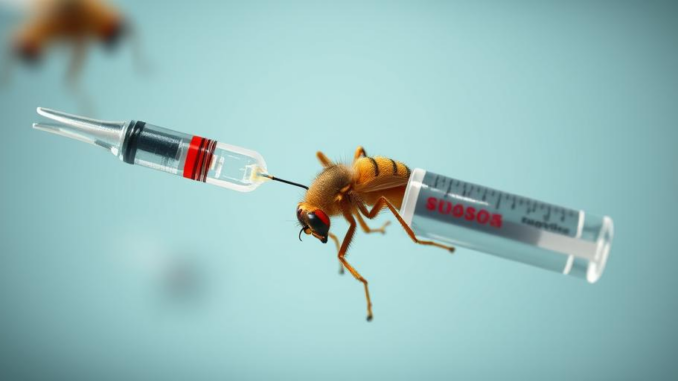
Summary
This article discusses the alarming resurgence of measles and emphasizes the importance of protecting immunocompromised children. It explores the challenges in determining immunity in this group, highlights new research advocating for age-appropriate antibody thresholds, and provides practical advice for parents. The article also underscores the urgent need for increased vaccination rates to safeguard community health.
Secure patient data with ease. See how TrueNAS offers self-healing data protection.
** Main Story**
Measles on the Rise: A Growing Threat to Immunocompromised Children
Measles, a highly contagious disease once considered eradicated in the U.S., is experiencing a concerning resurgence. This resurgence poses a significant threat to all children, but particularly to those with compromised immune systems. These children face a higher risk of severe complications, including pneumonia, encephalitis, and even death, if they contract measles. As of March 23, 2025, the situation is particularly dire in Texas, where a measles outbreak has resulted in hundreds of cases, dozens of hospitalizations, and two fatalities. This troubling trend underscores the critical need for proactive measures to protect vulnerable children as measles continues to spread.
Challenges in Determining Immunity
One of the key challenges in protecting immunocompromised children is accurately determining their immunity to measles. Currently, antibody thresholds derived from studies in adults serve as the basis for determining whether a child needs a measles, mumps, and rubella (MMR) booster shot. However, new research reveals that these adult thresholds may not accurately reflect the immune status of children, potentially leaving a significant percentage of vulnerable children unprotected. This research strongly suggests the necessity for establishing age-appropriate antibody thresholds to ensure accurate assessment of immunity in children.
New Research, New Hope
A recent study published in Clinical Chemistry provides promising insights into addressing this challenge. The research indicates that using adult antibody thresholds to assess immunity in immunocompromised children fails to identify a substantial portion who require revaccination. This highlights the crucial need for age-specific thresholds to ensure the accurate identification of children who need booster shots. The findings of this study hold significant implications for improving measles vaccination strategies and protecting immunocompromised children from this resurgent threat.
Practical Advice for Parents
Amid the ongoing measles outbreak, parents can take several steps to protect their immunocompromised children:
-
Vaccination: Ensure all eligible family members are up to date on their MMR vaccinations. This helps create a “cocoon of protection” around the immunocompromised child, minimizing their risk of exposure.
-
Hygiene: Encourage frequent handwashing and sterilize household objects regularly to reduce the spread of germs.
-
Limited Exposure: If residing in or traveling to an area with an active measles outbreak, limit the child’s exposure to other people and public places.
-
Consult a Healthcare Provider: Discuss any concerns about measles with the child’s pediatrician. They can offer personalized guidance based on the child’s specific health situation and the local outbreak status.
The Urgency of Increased Vaccination Rates
The resurgence of measles highlights the critical importance of maintaining high vaccination rates within communities. When vaccination rates decline, herd immunity weakens, leaving vulnerable individuals, including immunocompromised children and infants too young to be vaccinated, at increased risk. The current outbreak serves as a stark reminder that measles is not a benign disease and that vaccination remains the most effective way to prevent its spread and protect those most vulnerable. The time for action is now. We must prioritize vaccination efforts, educate communities about the importance of vaccines, and dispel misinformation to protect the health of our children and ensure a safer future for all.


Given the challenges in determining immunity for immunocompromised children, how frequently should antibody testing be repeated to ensure consistent protection, particularly during outbreaks or in high-risk areas, and what are the logistical implications of more frequent testing?
That’s a crucial point! Determining the optimal frequency of antibody testing is definitely complex, especially considering the logistical challenges and resource implications of repeated testing. More research into cost-effective and easily accessible testing methods is really needed. This would greatly help ensure consistent protection for our immunocompromised children. Thanks for bringing this up!
Editor: MedTechNews.Uk
Thank you to our Sponsor Esdebe
The call for age-appropriate antibody thresholds is compelling. Could these thresholds be further refined by considering specific immunocompromising conditions, as the underlying immune dysfunction can vary significantly?
That’s a great point! Refining antibody thresholds based on specific immunocompromising conditions could definitely lead to more personalized and effective protection. Exploring how different immune dysfunctions impact antibody responses seems like a crucial next step in this research. Thanks for highlighting this important nuance!
Editor: MedTechNews.Uk
Thank you to our Sponsor Esdebe
The discussion on age-appropriate antibody thresholds is vital. What are the potential challenges in implementing these new thresholds in diverse clinical settings, particularly regarding standardized testing and data interpretation across different labs?